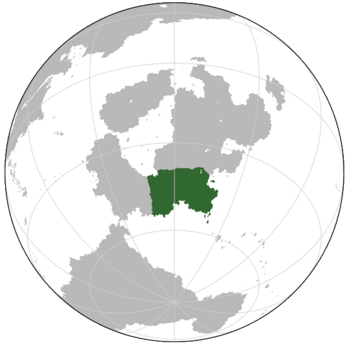Yawatha
Chiefdom of Yawatha 2 official names
| |||||
|---|---|---|---|---|---|
| Anthem: ᎥᏬᎾᎠᎧ, ᎥᏬᎦᎦ Uhahóna'kha, Uhakwahá | |||||
 | |||||
| Capital | Yahatlehnehkolyan | ||||
| Largest city | Watsiyulsonehe | ||||
| Official languages | Dilanian | ||||
| Recognised regional languages | Yawathan | ||||
| Ethnic groups (2023) |
| ||||
| Religion (2023) |
| ||||
| Demonym(s) | Yawathan | ||||
| Government | Federal democratic oligarchy under an authoritarian dictatorship | ||||
• Chief | Yá:wen Yohogwá:hne' Yahskennenhe | ||||
| Shaté:ka Thotahtes Satehsantye | |||||
| Kanentiio Yonkwá Kanyen'kehà:ka | |||||
| Legislature | Council of Clans | ||||
| Formation | |||||
| 1200s | |||||
| 9 April 1776 | |||||
| 15 March 1920 | |||||
| 1982-1986 | |||||
| 18 January 1987 | |||||
| Population | |||||
• 2023 estimate | 312,300,000 | ||||
• 2014 census | 284,420,109 | ||||
| GDP (nominal) | 2023 estimate | ||||
• Total | |||||
• Per capita | |||||
| Gini (2023) | very high | ||||
| HDI (2022) | medium | ||||
| Currency | Yawathan Yenaholi (¥) (YYE) | ||||
| Date format | dd-mm-yyyy | ||||
| Driving side | right | ||||
| Calling code | +98 | ||||
| ISO 3166 code | YA | ||||
| Internet TLD | .ya | ||||
Yawatha, officially the Chiefdom of Yawatha, is a country in eastern Galia. It is bordered by to the south and west by Onhsanenea and Dilania and to the Achrinian Ocean to the north and west. The country's climate is diverse, ranging from the dry Yú:wheqwasǫh Desert in its interior to vibrant rainforest in the coastal regions. The capital is Yahatlehnehkolyan but the largest city is the port of Watsiyulsonehe. Other major cities include Doyalsonye, Skakoonenholyan, and Konsyoskwah.
The majority of the population is of Yawathan descent, though minorities of various Eastern Galian ethnic groups, especially Dilanians in the south and Onhsaneneans in the west. Those who are not of Yawathan or Dilanian descent are generally discriminated against, with restrictions on voting and property ownership being common. In particular, the Gagian Holocaust during the Second Great War killed over 1.5 mill
The first protostate to arise out of what is now Dilania was the Dil, a nomadic warrior culture that covered much of southeastern Dilania and Naossia. While the Dil would collapse by about 1000 AD, its legacy remained as the optimal goal for other states in the region. The Dilani Empire would conquer much of what is modern Dilania and Onhsanenea in the 1400s and 1500s in a series of conquests. In 1776, a favorable marriage led to the addition of the Yawathan Kingdom into a duel monarchy known as the Dilanoyawathan Empire. Dilanoyawatha would split Onsland with Alanna in the early 1800s in a series of partitions, but relations would sour by the end of the century as Greater Niagara, Alanna, and Dilanoyawatha would compete for dominance in the Galian region. This rivalry culminated in the First Great War, which Dilanoyawatha lost, resulting in the Revolution of 1920, which ended the empire and split it into the Yawathan National Republic, an independent Onhsanenea, and the Dilanian State, a destralist and totalitarian state. Despite victory in the Second Great War, the Dilanian State stagnated and was unprepared for the Third Great War. Mounting losses and the prospect of a two front war led to the collapse of the Statist government and the rise of a federal republic in 1984.
Despite free elections in 1984, 1992, 1996, and 2002, the country fell into totalitarianism. The presidencies of Edah Korelia and Adahy Sequoyah have been criticized for increasing human rights violations and authoritarian tendencies. In 2015, Korelia died of a heart attack and was replaced by his Chief of Staff, Adahy Sequoyah.
Dilania is an authoritarian state where political repression is common and unapologetic. It is a member of the Mutual Defense Pact and is a frequent supporter of Inglaterra on the global stage. Despite this, it is a member of the Global Community and maintaisn informal relations with the Galian Economic Conference, though it was ejected from the bloc for ongoing human rights violations. Dilania ranks low in international measurements of freedom of the press and civil liberties. It has continued a number of Statist-era policies, such as state ownership of large sections of the economy.
Politics
Main Article: Politics of Yawatha
Government
Main Article: Government of Yawatha

